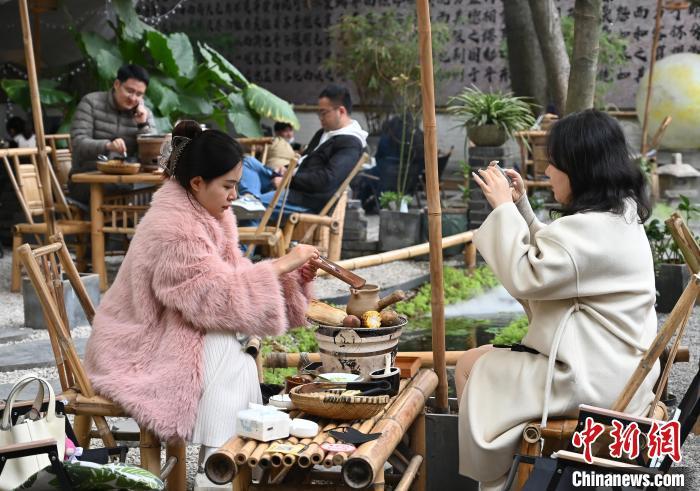Transfer from: Qianlong
China news agency, Jinan, June 20 - In recent years, Chinese young people prefer zero sugar diet, reflecting a healthy and healthy attitude towards life. Now, this "sugar free trend" has swept from the young people's table to the social circle - the concept of "sugar free society" is becoming more and more popular.
"Zero sugar social intercourse" generally refers to a social way in which contemporary young people keep a certain distance and independence in social intercourse, and do not want to excessively rely on others to provide emotional value. As the name implies, this social way is not sticky and dependent, just like zero sugar food.
In recent years, "cooking tea around the stove", a new way of eating tea, has been favored by the younger generation and has become a new favorite of young people's social life. (Information picture) Photographed by An Yuan, a reporter from China News Agency According to the 2024 Social Trend Insight Report released by the Just So Soul Research Institute at the beginning of this year, contemporary young people have an average of two intimate friends. When facing the problem of "the best state to get along with friends", 54% of young people choose to "keep in touch, but also have their own space for solitude".
In the "zero sugar social" circle of Huang Zixi, the "post-95", she maintained a relaxed and unconstrained relationship with her designer friends. "We don't get together or socialize frequently, but choose to share our design works, experience and confusion through online group chat or regular offline communication activities," said Huang Zixi.
"In today's society, people's social needs are becoming more and more complex, and sometimes I'm tired of dealing with them." Designer Huang Zixi told reporters that "Zero sugar social networking" allowed her to simplify social relations, reduce social costs, and choose social objects according to her needs and interests, rather than being constrained by the "emotional maintenance" and "face thinking" in traditional social networking.
Zheng Yutong (a pseudonym), a college student after the "00" generation, also has expectations for comfortable social relations. She always has a pot of green plants on her desk. She said that whenever she felt overly involved in a social relationship or had high expectations of her friends, she would look up at the pot of green plants and use this "trick" to remind herself, "return to a peaceful and free attitude."
On May 1, a panda themed camp opened in Tianjin, creating a new outdoor social space. (Information picture) Photographed by Tong Yu, a reporter from China News Agency "Zero sugar social interaction" is not limited to interpersonal communication. By combing social platforms such as Xiaohongshu and Zhihu, we can find that "human-computer interaction" is also popular. The concept and manifestation of "zero sugar social interaction" have been further extended in the virtual world.
These network contents show that when netizens feel lonely, virtual people, virtual idols and other digital roles become their new ways of companionship and communication. "The main reason why virtual people and virtual idols are popular is that they are 'grounded' and can not be high above others. They can be used as' spiritual netizens' and 'spiritual companions'." Netizen Xiaoqiao Liushui wrote in his post.
"The love of 'zero sugar social intercourse' is the expression of young people's pursuit of 'pleasing themselves'." Wang Zhongwu, a sociology professor at Shandong University, believes that contemporary young people are more willing to pursue a relaxed and trendy atmosphere of making friends with low communication costs when they are busy studying or working. The emergence of "zero sugar social intercourse" emphasizes autonomy and independence in communication, making social intercourse a burden free life experience.
"'Zero sugar social intercourse' does not mean 'zero social intercourse', but encourages young people to pay more attention to autonomy and independence in social intercourse." Wang Zhongwu believes that "zero sugar social intercourse" conforms to the trend of social development, and also meets the actual needs of modern social intercourse. "But while young people enjoy the ease and freedom brought by 'zero sugar social interaction', they should not ignore the fun and significance of traditional social interaction."




